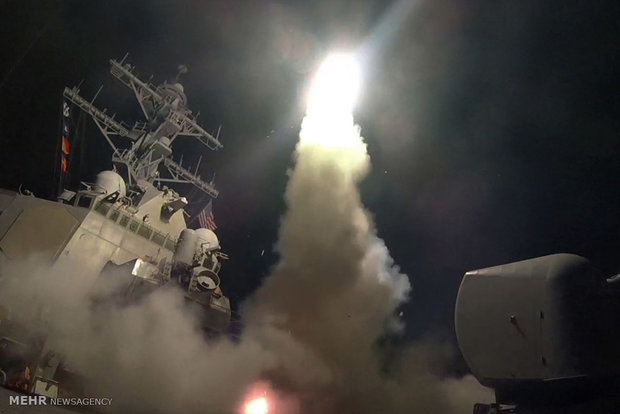Undoubtedly, Khan Sheikhoun has gave a new pretext to the US to repeat its threats and make them operational as Washington attacked Syria by its missiles a day after the incident.
The experts believe that US President Donald Trump has ordered airstrikes on Syria in order to attract the public opinion and compensate the defeat of the terrorists in Iraq and Syria.
These days, Washington has followed controversial policies in the region leading to fanning the flames of tensions and having no major consequences but destruction and chaos.
“Tonight, I ordered a targeted military strike on the air base in Syria from where the chemical attack was launched,” the US president said.
“It is in this vital national security interest of the United States to prevent and deter the spread and use of deadly chemical weapons,” Trump said.
Former head of the Foreign Relations Committee of Iran's Nationasl Security Council Seyyed Hossein Mousavian believes that Trump's Syria strike puts America at the precipice of another Middle East war and the consequences could unleash something worse than what followed the invasion of Iraq.
In an article published in Huffingtonpost, Mousavian has warned against dangerous consequences that US missile strike on Syria could have after the dust settles and the instability that it might bring with it in the months ahead.
“A week after the Trump administration made the decision to launch a cruise missile strike against Syria’s Shayrat air base, it is no surprise that the attack dangerously increased tensions in the Syrian civil war and emboldened forces that aim to maintain a state of chaos in the country,” Mousavian wrote.
“But what remains to be seen is what happens after the dust settles and the real impacts of the attack come to a head, especially in the country and surrounding region. So far, all signs point to more instability and less diplomacy in the months and years ahead, with the potential for an all-out Middle East war seeming increasingly likely”.
G7 Gathering in Italy
In an aim to oust al- Assad rather than questing a diplomatic solution and end supporting terrorist groups as well as leaving the future of Syria to its people without meddling in election, foreign ministers from the Group of Seven (G7) major industrialized nations convened in Italy aimed at put pressure on Russia to break its ties with al-Assad after the suspected chemical attack in Idlib province.
Britain and Canada said sanctions could be tightened on Moscow if it continued to back Assad as the civil war, now in its sixth year, drags on.
"I think we have to show a united position and that in these negotiations we should do all we can to get Russia out of Assad's corner, at least to the point that they are ready to participate in finding a political solution," German Foreign Minister Sigmar Gabriel said.
Fact-Finding Committee
The Islamic Republic of Iran has adopted a clear stance regarding the chemical attack in Syria, says the Foreign Ministry spokesman Bahram Qasemi, underlying that:
“Iran strongly condemned the chemical attack in Syria and was the first to ask for formation of an international fact-finding committee to look into the issue.”
He said that with great determination Iran put forward the issue of creating a fact-finding committee on Syria and Tehran agreed on the issue with its neighbors as well as Damascus.
What happened in Syria was suspicious, the Foreign Ministry spokesman said.
Head of Parliament National Security and Foreign Policy Commission Alaeddin Boroujerdi said that the US polices in Syria are doomed to failure and the impacts of the US and Saudi Arabia defeats in Syria and Yemen are quite evident.
Unacceptable Move:
In a telephone call with his Kazakh counterpart, Foreign Minister Mohammad Javad Zarif described US’ unilateral move against Syria as unacceptable, underlining the need for impartial international probe into chemical attack in that country.
Meanwhile, in another telephone conversation with the Venezuelan foreign minister, Zarf referred to recent developments in Syria, calling on the Non-Aligned Movement to be more active in Damascus developments. Venezuela is the present rotating president of the NAM.
During another phone calls with his Brazilian and Bolivian counterparts respectively, Zarif condemned chemical attack in Syria as well as US’ unilateral move against the country urging for an international impartial investigation into it.
UN’s Khan Sheikhoun Resolution
On April 13, Russia vetoed a resolution by US, UK and France to the UN Security Council to examine the use of chemical weapons in Khan Sheikhoun in Syria.
Russia, as one of the five permanent members of the UN Security Council, vetoed the US-backed resolution while Moscow last week presented a draft resolution to the Council calling for inspection of the incident in Khan Sheikhoun.
Through their draft resolution, the Western countries did call on the Syrian government to give all information about its military operations on April 4 when the chemical attack occurred in Khan Sheikhoun; such a call brought Russia’s disagreement.
The Western media and officials unfoundedly try to condemn Syria for the alleged use of chemical weapons in Khan Sheikhoun, while the Russian and Syrian officials stress that blast of terrorists' ammunition depot in that region has caused the incident.
Now after about six years of war in Syria, what have been seen from the US governments and their double standard politics as well as the US authorities' biased and paradoxical statements?
What is seen from such policies is nothing but bloodshed and carnage of innocent people? In fact, the US is trying to cast its ominous shadow all over the world to run countries and plunder their resources.
The US has adopted a new hegemonic approach of using never-ending threats against other countries and unleashing the military forces to unlawfully attack nations around the world.
It is expected from Washington and officials to respect toward nations and their interests instead of creating warmongering policies toward them.

























Your Comment